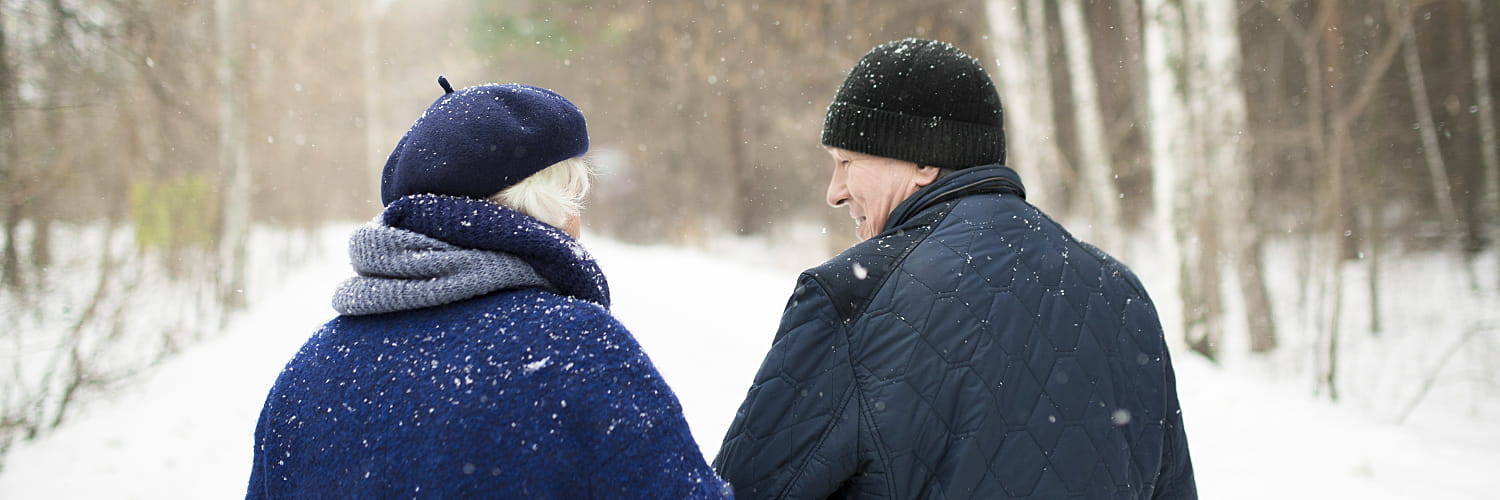As you get older, you may have challenges regulating your body heat. Age-related metabolic changes, reduced circulation, and certain medications can all make it more difficult to maintain a normal body temperature.
Winter is just around the corner. For older adults, it's worth taking a few extra precautions to stay safe. Here are five winter safety tips for seniors to keep in mind during this time of year.
1. Winterize Your Home
One of the easiest ways to stay warm inside is to keep the cold out. Drafty windows, open vents and even small cracks in doors can cause the temperature inside your home to drop. To winterize your home, use weather stripping or caulk to seal air gaps in windows; you can either DIY this or call a handyman service. Keeping your curtains and drapes closed can also help your home retain heat. Cold air even makes its way in through your outlets, so use foam outlet covers to keep the cold air out.
When you're at home, keep your thermostat at no lower than 68 degrees. A programmable thermostat ensures your house is always at the right temperature and that you're using energy as efficiently as possible.
2. Be Careful With External Heat Sources
Some people use space heaters, fireplaces and lanterns as heat sources in winter. Although these options are effective, they also pose safety risks if you don't carefully monitor them.
If you plan to use any of these items, make sure your carbon monoxide detectors work properly and check that any heater you use features an automatic sensor able to shut off the device once it goes above a certain temperature.
3. Bundle Up
Dress for the weather, even on sunny winter days. Even if you're going outdoors for only a short period, dress in multiple thin layers of clothing. Wear a hat, scarf, gloves and a heavy, waterproof jacket. If your clothes get wet or damp because of the snow, change them as soon as possible — wet clothing reduces your body temperature more quickly than dry clothing.
Because temperature regulation becomes more difficult as you age, not dressing warmly enough can increase your risk for hypothermia, a condition in which your body temperature drops rapidly. The signs of hypothermia include cold feet and hands, shivering, slurred speech, pale skin or a swollen face. Once you know what to look for, you can stay vigilant about monitoring changes in your body and better recognize when to seek medical attention.
4. Consider Your Medications
Certain medications, such as those for arthritis and diabetes, can make it more difficult to regulate your body temperature. Particularly if you have a chronic condition, you may not be able to stop taking these medications — however, it's still important to talk to your doctor about how your medications could affect temperature regulation and whether it's necessary to adjust your dosage or try a new treatment regimen. Along with reviewing your medications, your doctor may recommend you take a cautious approach to avoid hypothermia.
5. Reduce Your Risk of Slips and Falls
Winter weather also creates the potential for slips and falls.
To reduce this risk, salt and shovel your walkway and driveway — or ask a friend, family member or snow removal company to do the same. Make sure all railings outside your home are tight and secure, and wear comfortable shoes with a sturdy grip and nonskid soles whenever you go outside.
Following key winter safety tips for seniors can help you protect yourself and your home when the weather turns frigid. Taking a few smart precautions helps ensure that you can enjoy the celebratory holidays, snowfall and family gatherings while staying safe and warm this season.


 Satta Sarmah Hightower
Satta Sarmah Hightower










